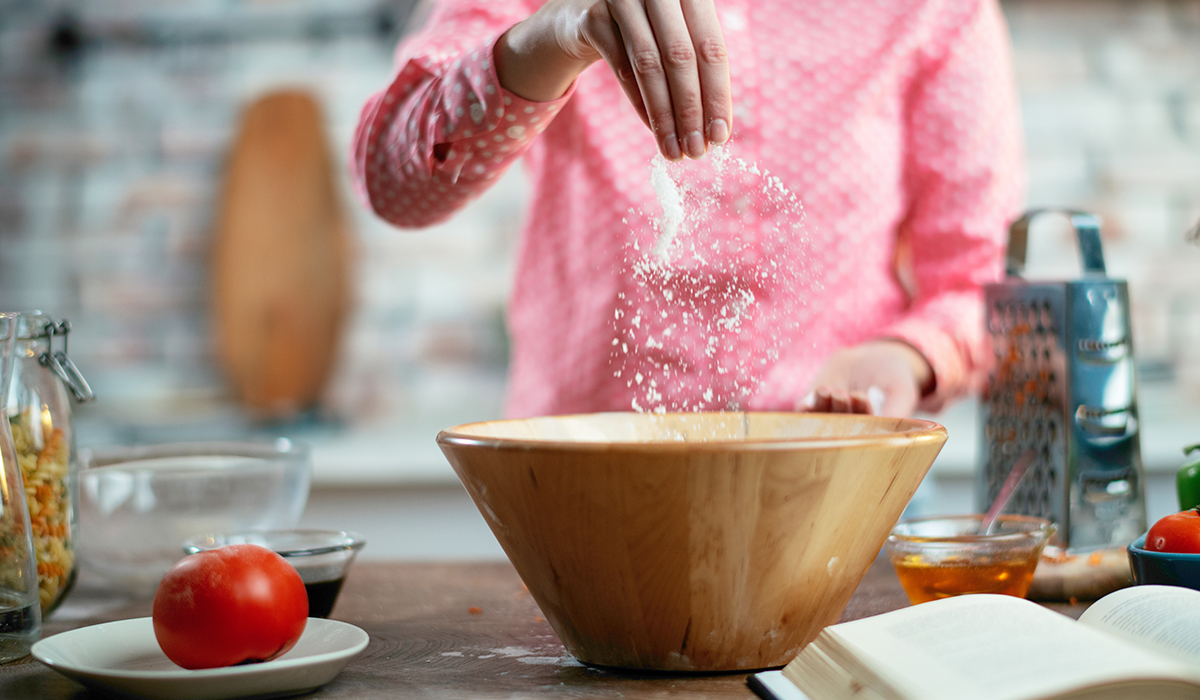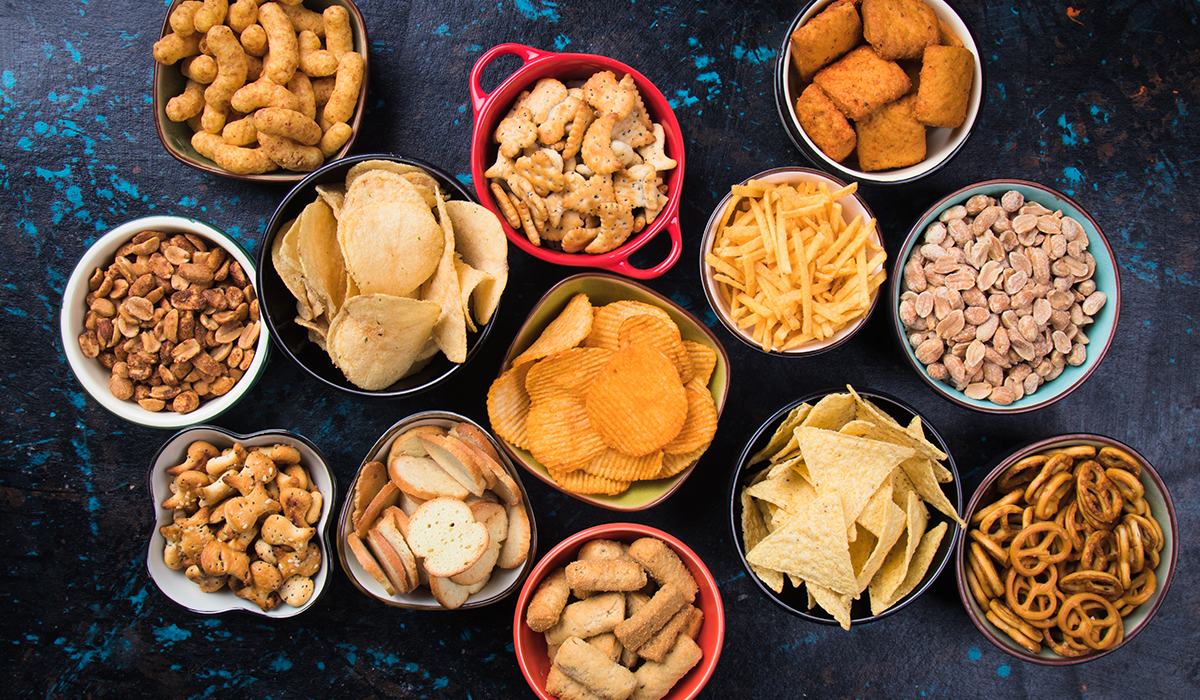The Nutracheck nutrient guide to: salt
Emma & Beth - Nutracheck Nutritionists | 07 May, 2025
We place a lot of emphasis on the number of calories in our diets as this is central to our weight loss success, however we mustn't overlook the importance of the nutrients we need too. After all, the food on our plates is made up of different nutrients in varying proportions – calories are just the total energy they all provide.
To help you understand more about the nutrients in your food and why they're so important, we've put together the ultimate series of nutrient guides to bust the myths and equip you with all the nutritional know-how you need to make informed choices about your diet and your health. We’ve covered carbohydrates, protein, fibre and sugar so far – now, we're looking at...salt!
The basics
Dietary salt is made up of sodium and chloride ions. Sodium is an essential mineral that plays a key role in:
- Relaxing and contracting our muscles (including the heart)
- Sending impulses along our nerves to signal around the body
- Regulating how much water is in our blood and cells.
Sodium attracts water, so the more we eat, the more our body holds onto water. Our bodies constantly try to balance our internal concentrations of sodium and water. This is why you might feel increased thirst after a particularly salty meal – it's our body's way of trying to dilute excess sodium levels. Conversely, if you've ever had an electrolyte drink, these almost always contain sodium to help recover what is lost through sweating causing dehydration.
If we don't eat enough sodium in the long term, or we drink too much water and acutely dilute the concentration of sodium within our body, we may develop a condition called hyponatraemia. This can have potentially life-threatening effects, causing muscle spasms and swelling of the brain. Therefore, eating some salt is important to maintain overall health.
It's estimated we need around 1.25g of salt for our bodies to perform these essential functions. This amount varies from person to person depending on size and activity levels, however most of us are easily meeting and far exceeding this amount, hence why the guidelines are the same for everybody – read more on this below!

What can happen if we eat too much salt?
Eating too much salt can raise our blood pressure to unhealthy levels. But why does this happen? If we eat lots of salt, we absorb more sodium into our blood. The elevated sodium concentration attracts water, meaning the volume of water in our blood increases. This increased volume can create more pressure on our blood vessels, raising blood pressure. High blood pressure is linked to several health problems, including heart disease, stroke and kidney damage. If you’re already living with high blood pressure, eating too much salt could make this worse, and might weaken the effect of any medications you take for your blood pressure.
Eating lots of salt can also impact our bone health. When there’s too much salt in our blood, our body signals to us that we're thirsty – you might have experienced this feeling first hand after a takeaway or salty snack. This is to increase the water in our bodies to help flush out excess sodium through our urine. We also lose other minerals in our urine, including calcium. The amount of calcium lost in urine can increase with the amount of salt we eat, and if our blood calcium levels drop too low, our body calls on its primary storage of calcium – our bones. Losing calcium from our bones in this way over time can weaken our bone tissue, increasing the risk of conditions like osteoporosis.
You might have heard or thought that drinking more water can counter the effects of overeating salt. Although it might help to restore balance in the short term as we discussed above, this doesn't prevent the negative consequences for our bone health.

Can salt affect weight?
Dietary salt doesn't provide us with any calories, so it doesn't directly affect fat gain/loss. However, the relationship between water and salt can mean that eating a diet high in salt causes us to retain more water to maintain a normal salt-to-water ratio. Water retention isn't a reflection of fat loss, but can cause progress on the scales to slow down or fluctuate.
Additionally, many foods that are typically high in salt are also higher in calories, and offer little in the way of nutrition. Pizzas, pies, crisps, salty chips and other processed ready meals might be tasty thanks to their high salt content, but perhaps aren't the best regular choice, particularly if you're on a mission to lose weight.
What's a healthy daily salt intake?
For all adults, it's recommended we cap our daily salt intake at 6g. Ideally, our salt intake should fall lower than this, as we'd get all we need from just a quarter of the maximum guideline daily intake.
How can I keep my salt intake at a healthy level?
With salt now found in so many different foods, even those you'd least expect (prawns, hot chocolate, lower-calorie ready meals and even diet tonic water!), it might seem challenging to keep your salt intake under that 6g cap. Here are some tips to help you navigate a sensibly seasoned diet!
- Choose lower-salt versions of very salty ingredients, like soy sauce, stock, gravy granules and condiments.
- Add herbs and other seasoning to your cooking in place of salt, like black pepper, chilli, vinegar, garlic, ginger, and lemon juice. If you're used to salty food, this could take some getting used to, but it is possible to retrain your tastebuds and lower your tolerance for salt.
- Taste your food before you add salt. We can often add salt without actually tasting first to see if we really need it.
- Try using a lower-sodium salt, like LoSalt™, to reduce your overall sodium intake. These salt alternatives replace some of the sodium chloride with potassium chloride, which is very similar in taste.
- Stay hydrated to help your body clear excess sodium – read more about the importance of water here.

How can I watch my salt intake with Nutracheck?
In the Nutracheck app, we set your salt allowance to 6g per day in line with government guidelines, regardless of your weight or health goal. As salt doesn't contain any calories, the target isn't affected or changed by your calorie target. To focus on tracking salt in your diary, tap the top of either column and select 'SALTg' from the drop-down list.
However, you might be interested in trying a lower-salt diet. Perhaps you've been diagnosed with hypertension or another medical condition that would benefit from a reduced sodium intake. Or you may just fancy a challenge! Regardless of your reasoning, you have full flexibility to choose your salt targets with Nutracheck. Our 'Set My Own' nutrient goal allows you to assign your own calorie and nutrient targets, including for salt.
To set yourself a reduced salt target in the Nutracheck app, tap the blue menu button next to the search bar in your diary > 'Nutrient Goals' > 'Set My Own goal'. Scroll down to the salt figure and tap to enter your preferred target. Save this by tapping 'Apply Changes'.
On the Nutracheck website, click 'Settings' from the menu at the top of your Diary page > 'Set a nutrient goal' > 'Set My Own goal'. Then enter your preferred salt target and click 'Apply Changes'.

Nutritionists Emma White (ANutr), MSc Human Nutrition and Beth Furness (ANutr), BSc Nutrition and Health, are passionate about diet and how this impacts overall health. They support evidence-based advice around nutrition and aim to help everyone better understand how different nutrients affect the body and long-term health status.












